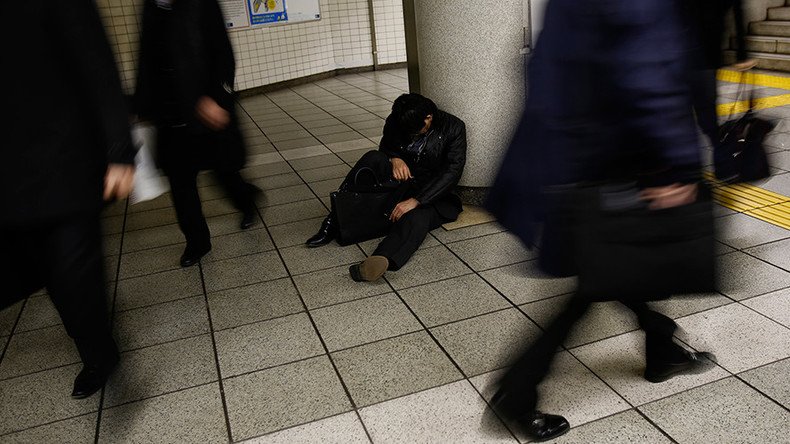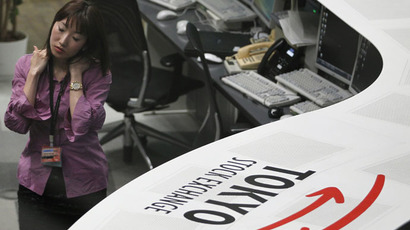A new Japanese government poll has shown that a fifth of the country’s employees face the risk of death from overwork.
The survey was part of the first research into what the Japanese call ‘karoshi,’ which literally translates to ‘death from overwork.’ The study, which has been endorsed by the cabinet of the country’s premier, Shinzo Abe, was published on Friday.
The research targeted some 10,000 companies and 20,000 workers, of which 1,743 companies and 19,583 workers responded over two months, between December 2015 and January 2016.
The Japanese are notoriously known for their strict work culture and putting in long hours. Hundreds of deaths from overwork are recorded every year, most of which are due to strokes, heart attacks, or suicide.
Suicides are an especially acute problem. According to National Police Agency statistics cited by the Japan Times, 2,159 people took their own lives due, at least in part, to work-related problems in 2015.
The study, which provides details on overwork in the Japan, found that about 21 percent of Japanese employees log 49 or more hours per week, while in the US, the UK, and France the figures stand at between 10 and 15 percent, on average.
Moreover, 22.7 percent of enterprises reported that some of their workers put in more than 80 hours of overtime per month. This extra 80 hours – some four hours per day – is officially known as the threshold after which risk of death escalates dramatically.
However, the sky’s the limit – 11.9 percent of companies said they had workers logging more than 100 hours of extra time per month. Almost 30 percent of these overworked employees are employed in IT and communications, the study showed.
Other areas in which employees tend to work extra-long hours, are academia, postal services, and transport.
More importantly, not only do the Japanese spend a lot of time at work, but they also feel a great amount of stress because of this.
The number of compensation claims brought by the relatives of karoshi victims jumped to a record high of 1,456 in the fiscal year ending March 2015, according to labor ministry data, with most cases reported in healthcare, social services, shipping, and construction.
In April, Hiroshi Kawahito, secretary general of the National Defense Counsel for Victims of Karoshi, said the real number was probably 10 times higher, Reuters reports.
The problem of overwork, as well as the deaths and medical, psychological, and emotional disorders resulting from it, has been acknowledged in Japan since at least the 1980s. The Japanese government is now aiming to lower the percentage of employees working more than 60 hours per week to five percent of the total workforce.
It also intends to convince all workers to take at least 70 percent of their paid holiday by 2020.
Emiko Teranishi, 67, the head of a nationwide network of karoshi victims’ family members, touted the study, saying the 280-page document was of special significance for the group.
Teranishi’s husband, who was a manager at a soba noodle restaurant in Kyoto Prefecture, committed suicide due to work pressures 20 years ago, after he became sleep-deprived and depressed as the recession hit.
“He worked 4,000 hours a year,” Teranishi said. “The company had him punch a time card every day, so it knew that he worked that hard. In the days before his death, he had told his boss he had no appetite, he couldn’t sleep and was exhausted. The company knew he was at high risk [of karoshi].”
So what explains the karoshi phenomenon in Japan?
“Historically, this has come out of the ‘Japan Inc.’ mentality of the company as a family-like organization where people felt so emotionally invested that they were willing to spend – for the men – practically every waking hour devoted to the company,” sociology professor Kyle Cleveland, an associate director of the Institute of Contemporary Asian Studies at Temple University’s Tokyo campus, told USA Today.
“Arguably, that was the engine that drove the miracle of the Japanese economy, (but) this is one of the consequences,” he said.



